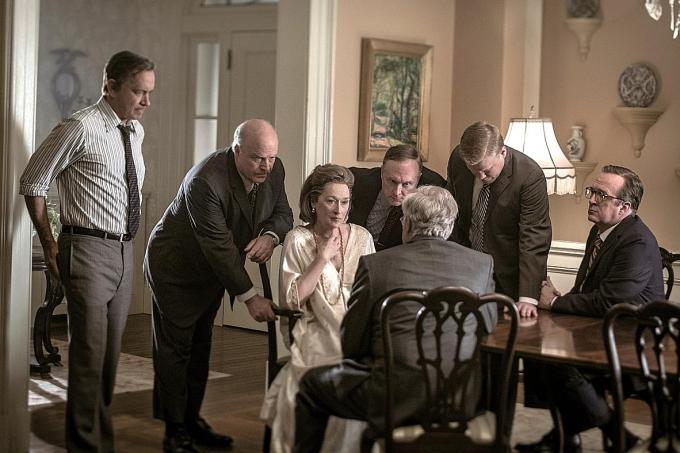
No man can serve two masters: for either he will hate the one, and love the other; or else he will hold to the one, and despise the other. Ye cannot serve God and mammon. – Matthew 6:24
The Post recounts the leaking of the famed Pentagon Papers, a three decades old analysis of the Vietnam War and America’s chances of military success spanning four Presidential administrations. Katharine Graham (Meryl Streep) has becom the first female publisher of The Washington Post following her husband’s suicide. As she attempts to navigate the news world while reconciling it with her high-powered relationships, her editor Ben Bradlee (Tom Hanks) works to convince her to allow him to publish the papers, at great risk to their careers and freedom.
The Post is an examination of the struggle to define who you are and what your principles are, and then having the courage to stand by your convictions. This struggle is played out through the experience of Mrs. Graham, who is forced to choose between her previous life as a well-liked socialite and her new position as the publisher of what was then the small, family-owned paper The Washington Post. Mrs. Graham feels the pressure of staying in the good graces of powerful friends and protecting the legacy of her family and the paper it has built. Her resolve is continuously tested as government pressure over the publication of the Pentagon Papers grows and her editor and reporters wish to defy the heavy handed response and do their jobs of reporting the news. Mrs. Graham finds that she must choose one or the other and straddling the fence and doing both is not an option. On top of this pressure, Graham has to contend with being a powerful woman in an industry where there aren’t any others like her, and her authority and competence are continually called into question. The question of keeping access to powerful figures vs. being dogged investigators is still one the press struggles with and women today still must fight to be taken seriously in high powered positions. The confluence of all of these issues is especially relevant to our current experience and helps to add some heft to The Post.
Despite the continued relevancy of its story, the plot itself is rather mundane. There’s a legal tug and pull on whether or not the Papers will be released and in the end, someone must make a decision on what to do, the decision-maker reaches the conclusion that the audience is hoping for, and the “good guys” win. It’s not anything we haven’t seen before. Where The Post excels, is in its conveyance of the tension that this tug of war with the fate of publication of the Papers creates. We know the history of how this will play out which contributes to the simplicity of plot, but the direction of the film keeps the viewer invested in the outcome.
What mostly saves this movie from being a disappointment or a wasted watch are the performances from the main actors Streep and Hanks. In what is one of his best performances in years, Tom Hanks is great as the idealistic news editor Bradlee who is fiercely committed to the tenants of his profession and is willing to sacrifice everything to serve what he sees as the public good and his professional duty. Hanks transforms himself and becomes the person he portrays. Streep also excels as an older woman thrust into a position that she has to master quickly, tugged and pulled between two worlds with a pressure to live up to the expectations present in both. You feel the mostly subtle discrimination she faces and the worry she has about disappointing the family she’s lost in her life and who have entrusted her to carry on the legacy she is a part of. Both performances are engrossing and carry the majority of the film, solely justifying the price of admission.
All in all, The Post is an adequate film elevated by the strength of the actors that lead it. It serves as an interesting look back to a time that mirrors our own and can galvanize many who watch it into acting in ways that will help us survive our own time with those who wish to use institutions to fundamentally change how our society works.
Image: 20th Century Fox

